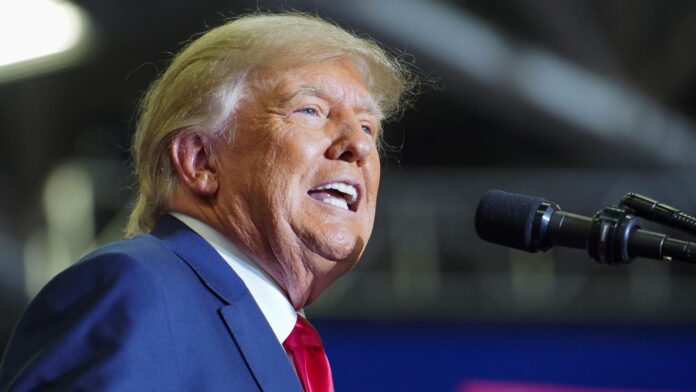Former President Donald Trump lashed out Thursday after a federal judge wrote that Trump knowingly pushed false claims of voter fraud while he was fighting his 2020 election loss.
Trump, in a post on his social media platform Truth Social, lambasted U.S. District Judge David Carter as a “partisan hack” and repeated his false claim that his loss to President Joe Biden was the result of a “rigged and stolen” election.
The ex-president’s outburst came one day after Carter ordered John Eastman, a pro-Trump attorney who tried to challenge Biden’s win, to turn over dozens of documents to the House select committee investigating the Jan. 6, 2021, Capitol riot.
Among those 33 documents were emails that “demonstrate an effort by President Trump and his attorneys to press false claims in federal court for the purpose of delaying the January 6 vote,” Carter wrote.
In late December, Eastman relayed concerns to Trump’s attorneys about citing supposed evidence of voter fraud in Georgia’s Fulton County. Trump’s attorneys made the fraud allegations in a state court filing earlier that month, and Trump and his legal team wanted to incorporate the same claims into a federal lawsuit, Carter wrote.
But Eastman pushed back, saying in an email that even though Trump signed a verification for the state court filing, “he has since been made aware that some of the allegations (and evidence proffered by the experts) has been inaccurate,” according to the judge.
Trump and his legal team nevertheless went on to file the complaint “with the same inaccurate numbers without rectifying, clarifying, or otherwise changing them,” Carter wrote.
“The emails show that President Trump knew that the specific numbers of voter fraud were wrong but continued to tout those numbers, both in court and to the public,” the judge determined. “The Court finds that these emails are sufficiently related to and in furtherance of a conspiracy to defraud the United States.”
Those emails were part of a batch of eight communications that Carter ruled were subject to the “crime-fraud exception” to legal privileges, such as attorney-client privilege, that might otherwise protect Eastman from disclosing the documents.
Carter ruled that the crime-fraud exception also applied to emails showing Eastman and other attorneys for Trump suggesting that a “primary goal” of a court filing “is to delay or otherwise disrupt” the Jan. 6, 2021, congressional vote to confirm Biden’s electoral victory.
Eastman, a former law school dean at Chapman University, had penned a memo outlining a dubious legal strategy for Vice President Mike Pence to reject Electoral College votes for Biden while presiding over a joint session of Congress on Jan. 6.
Pence refused, enraging Trump and thousands of his supporters, some of whom chanted “Hang Mike Pence” as they swarmed the U.S. Capitol. The attack forced Pence and members of Congress to flee their chambers, delaying their efforts to confirm Biden’s win.
Trump’s Thursday morning post called Carter out by name.
“Who’s this Clinton appointed ‘Judge,’ David Carter, who keeps saying, and sending to all, very nasty, wrong, and ill informed statements about me on rulings, or a case (whatever!), currently going on in California, that I know nothing about — nor am I represented,” Trump wrote. “With that being said, please explain to this partisan hack that the Presidential Election of 2020 was Rigged and Stolen. Also, he shouldn’t be making statements about me until he understands the facts, which he doesn’t!”
Carter’s ruling Wednesday ordered that portions of emails related to Eastman’s plan for Pence must also be shared with the House committee that is investigating the Jan. 6 riot. The panel last week voted to issue a subpoena to Trump for documents and testimony related to the insurrection.
In January, the select committee issued a subpoena seeking messages sent from Eastman’s Chapman email account between late 2020 and early 2021.
Eastman, who had previously declined to produce documents to the Jan. 6 investigators, promptly asked the Santa Ana, California, federal court to block Chapman from complying with the committee’s subpoena for his emails.
Carter ruled in March that Eastman must disclose 101 emails to the select committee that were the subject of disputes over legal privileges. In that decision, the judge wrote that it was “more likely than not that President Trump corruptly attempted to obstruct the Joint Session of Congress” on Jan. 6.


